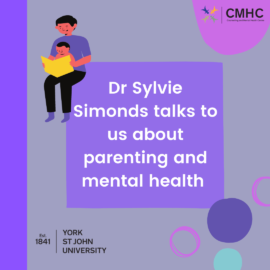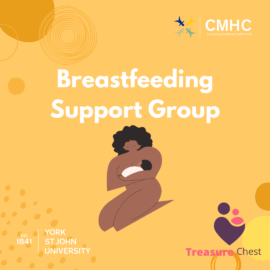Hello everyone, we hope that you’re all having a great week!
As you might know, this week is Maternal Mental Health Awareness Week, an event organised by the Maternal Mental Health Alliance (MMHA) that is dedicated to openly discussing mental health problems faced during and after pregnancy. The Maternal Mental Health Alliance want us all to use this week as a chance to raise awareness of perinatal mental health, and give us all an opportunity to really understand some of the very real struggles of parenthood in all its’ forms. The MMHA describes Maternal Mental Health week as, “A week-long campaign dedicated to talking about mental health problems during and after pregnancy. It’s all about raising public and professional awareness of perinatal mental health problems, advocating for women affected by it, changing attitudes and helping families access the information, care and support they need to recover.”
Becoming a parent is one of the biggest changes that we ever face as human beings. We believe that it’s so important, particularly in 2021 with all the challenges that the last twelve months have brought, that all parents feel prepared and supported. At CMHC, we want to normalise seeking help and advice; it’s so important that we support one another in the community. So with this in mind, we decided in the spirit of Maternal Mental Health Awareness Week that we would do some research ourselves and find out from parents, carers, and guardians in the York community: What do you wish you could have told yourself before you became a parent? For this weeks’ blog here is a compilation of what they came up with. Some of the advice is for brand new babies, and some came from parents’ of older children with pearls of wisdom about childhood and teenage years.
Whether you’re expecting, a new parent, a foster parent, or a legal guardian feeling in need of some advice, here is a list of guidance from real people who have been where you are now and come through the other side.
What do you wish you could have told yourself before you became a parent?
“It’s okay to feel like you’re not coping all of the time, all of us do at some point.”
∼
“Raising a child, and having a baby is really really really (really) hard work, and some days aren’t all fun and smiles – that’s okay, you’re still a good Mam and your kid still loves you.”
∼
“Talk to other parents, not just about the fun stuff but also about the real stuff. It’ll make you both feel better.”
∼
“Birth: Don’t worry. It’s only scary and new for you, it’s another day at work for everyone else in the room. Also, your body knows what to do even if your brain doesn’t, so let it take over. Hypnobirthing worked for me, it was an amazing tool for getting my brain to concentrate on breathing and steadying myself instead of letting it overthink and make me panic.”
∼
“I didn’t realise that G.P.s and midwives often had different ideas about things. Something I had to get used to. Trust your gut, you’re more in tune with your baby than you think!”
∼
“You will forever worry about your children, and that is absolutely normal.”
∼
“Don’t feel guilty about not wanting the world to see and hold and visit your baby in the early weeks. If people care about you then they will wait until you’re ready. Also on first visits, you’ll be naturally worried about Covid and Herpes and all the other scary things people warn you about. Discuss with your partner/family what you’re happy with and then be prepared for the things you want. If you get any unannounced visitors in the first few days have your excuse planned out with your partner to save on embarrassment or worse: Entertaining when you’re exhausted. These are your first days with your baby too and it’s critical time for your own bonding, if you don’t want to be passing your baby around to a distant relative and making them endless cups of tea – that’s absolutely fine and you should not feel guilty for it!”
∼
“Breastfeeding is tough – and it only works if it makes you and baby happy. Formula is fine, and you can do combination. Baby will be fine either way.”
∼
“I wish I had known about this thing called maternal ambivalence – which is basically the experience of having lots of different emotions towards your children, some of them will be positive and some of them will be negative, and sometimes you’ll have days where you are feeling really angry towards them or you’re not enjoying it so much – and that is not only normal, but is healthy and is actually productive to your child as they need you to have varied emotions towards them, and so there is no use to try and be a perfect parent – it’s ok and healthy to have negative feelings towards your children sometimes.”
∼
“Love them as much as you can and really be there for them. It’ll be hard but love and kindness, for yourself as well, are the only ways through.”
∼
“Crying for no reason is completely normal and should be encouraged. Don’t hold it in, just ride the wave. Don’t be afraid when your midwives visit to tell them if you feel overwhelmed or upset, or you haven’t had the rush of love with your baby yet – it’s all normal and they’re there to help you, no one is going to snatch your baby away and tell you you’re a bad parent because hormones aren’t being your friend.”
∼
“Accepting all kinds of help doesn’t make you any less of a mum, if someone wants to come and rock your screaming baby, or make your dinner, or do your laundry it won’t take away from the fact that you’re doing an amazing job!”
∼
“Choosing not to follow someone’s advice, whoever they are, is your right and you shouldn’t feel bad about it. This is your baby or child and you’re the one raising them. Listen to other people, but don’t be afraid to say: I am going to try it a different way. That goes for when someone else is looking after your child, they should be following your methods and beliefs. If Granny is babysitting and says ‘We let you cry it out and it never hurt you’ don’t be shy of saying, ‘I respect that but that’s not what we’re doing with our baby’”
∼
“People will come to you all sorts of advice, well intended usually, or they will tell you shouldn’t have done things a certain way, or you should have done it another way, and basically not to take any of it to heart, and take it with a massive pinch of salt!”
∼
“You can survive pretty well on 4hrs sleep a night, it’s not forever.”
∼
“Having a child massively impacts in your relationships, it can be reassuring in a positive way as you can make really good and unbreakable bonds with people who have that shared experience, and life-long friends. And you also find out who of those of your friends stay in contact and support you, but then other friendships are called into question, and not just friends but family members as well. It really clarifies who you can count on, and that can be a really positive thing – it’s important to embrace new friendships and sources of support – it is out there, it’s just a matter of finding it.”
∼
“Your experience of having a baby is completely dependent on what baby you get! It makes such a different to your experience as all babies can have very different temperaments, and I’ve really learnt that the second time round because both my children have been very different as babies and it can really make a difference to how much pleasure you find in it, or how difficult you find it.”
∼
“Listen to your children. Really listen to what you’re being told. Seek clarification, but don’t offer advice unless you’re asked for it. Offer help. Be kind, as kind as you think you can be and then be kinder still. Sometimes it will feel pointless, but in the end it won’t be.”
∼
“Do your own research. Read! You need to understand what’s going on, read and learn whatever you can. Waterstones always has a great parenting section and there’s nothing wrong with asking other parents for advice.”
∼
“Don’t be afraid to get that support if you’re going through hard times.”
Thank you to all the people who contributed to this list of amazing advice. To end this weeks’ blog, we want to take a moment to remind any parents reading this post that there is always support and help available. Below is a list of resources that you can lean on for information, support, or a listening ear – whenever you need it.
York Counselling and Mental Health Centre
Maternal Mental Health Alliance


